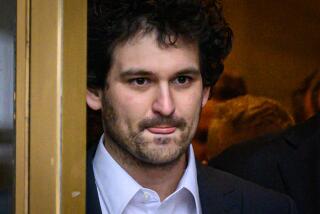Skilling Lives Up to His Billing
- Share via
HOUSTON — During his eight pivotal days on the witness stand, it became clear that nobody could control Jeffrey K. Skilling -- sometimes not even Skilling himself.
Daniel M. Petrocelli, Skilling’s urbane and witty lead defense lawyer, has joked several times that even if he’d written a script for Skilling’s testimony, it wouldn’t have worked because his headstrong client is “absolutely un-rehearsable.”
Under both friendly examination by Petrocelli and antagonistic grilling by prosecutor Sean M. Berkowitz, the former chief executive of Enron Corp. often had trouble reining himself in. He bristled at questions, offered humorous or sarcastic asides and occasionally asked questions of his own.
“Skilling wasn’t able to take off his CEO hat,” said Mark C. Zauderer, a New York-based litigator who has been following the case.
There were few clues as to how the testimony affected the jury of eight women and four men, and its ultimate effect won’t be clear until a verdict is rendered, if then.
In Zauderer’s estimation, though, Skilling’s refusal to concede Berkowitz even the smallest point came across as evasiveness. Houston defense lawyer Dick DeGuerin, however, saw it as a principled refusal to be pushed around.
“I don’t know that the jury had to like him; they just had to believe that he was right on the facts,” DeGuerin said.
Skilling said from the outset of his fraud and conspiracy trial in January that his own testimony would be his best shot at convincing a jury of fellow Texans that the government erred badly -- perhaps maliciously -- when it tried to pin him and former Enron Chairman Kenneth L. Lay with the energy company’s 2001 collapse. And after finally taking the oath, he declared in any number of ways that he was innocent.
The Skilling who appeared on the stand matched up closely with the man who jurors may have heard described in media accounts as blunt, detail-oriented, impatient and very, very bright.
He was also closely matched with his courtroom opponent Berkowitz, the co-lead prosecutor and a fellow Chicagoan by upbringing.
Skilling, 52, was a Baker Scholar at Harvard Business School, a distinction awarded to the top 5% of the class. Berkowitz, 48, finished first in his class at Tulane University and went on to Harvard Law School. Friends describe the lawyer as funny, resourceful and extremely competitive.
Berkowitz put some dents in Skilling’s credibility. For example, he showed that the defendant tried to sell 200,000 shares of Enron stock on Sept. 6, 2001, even though he had told securities investigators that his only reason for a big stock sale later that month was fear about the economic effect of the 9/11 terror attacks.
And Skilling’s repeated public statements -- played for the jury on tapes or flashed on the courtroom screen -- that Enron was not a major electricity speculator during the California energy crisis of 2000 and 2001 failed to jibe with former Enron energy trader Tim Belden’s testimony that his Western Power Desk raked in more than $800 million in nine months on just such speculation.
Skilling, for his part, used Enron securities filings to cast doubt on allegations that Enron had failed to disclose transactions with now-notorious off-the-books partnerships run by former Chief Financial Officer Andrew S. Fastow.
He rebutted Berkowitz on whether a key meeting with Lay had been a week after Skilling’s Aug. 14, 2001, resignation or nearly a month later. Skilling also showed an easy grasp of the details of some of Enron’s complex hedging strategies, although much of his technical testimony may have gone over the heads of jurors -- and everyone else in the courtroom.
Skilling “made the points he needed to make,” such as denying that he lied or pushed subordinates to hide losses or fraudulently pump up profit, said Houston lawyer Michael J. Wynne, although even in those cases his persistent combativeness may have betrayed him.
“He couldn’t answer some basic questions without a fight,” said Wynne, a former federal prosecutor who has attended much of the trial.
Berkowitz, for example, tried several ways to get Skilling to acknowledge that, as CEO, he was responsible for his company’s public statements. Skilling kept referring to the lawyers, accountants and more junior executives on whom he relied.
“You’re got to come across as completely candid,” Wynne said.
Skilling faces 28 counts of conspiracy, fraud and insider trading. Lay, 64, faces six counts of conspiracy and fraud. If convicted, they could each serve more than 20 years in prison.
Lay is expected to testify Monday and present a similar viewpoint but an entirely different demeanor than Skilling. Although he holds a doctorate in economics, Lay is an affable salesman type who mixed as easily with foreign dignitaries, business tycoons and the Bush family as he did with clerks and gas pipeline workers at Enron.
“Lay’s a nice guy,” DeGuerin said. “He was the face of the company. I think he will be able to win the jury over.”
More to Read
Sign up for Essential California
The most important California stories and recommendations in your inbox every morning.
You may occasionally receive promotional content from the Los Angeles Times.












